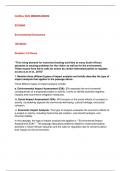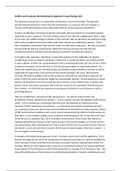Exam (elaborations)
ECS2606 EXAMINATION ANSWERS 25 OCTOBER 2023 QUALITY ANSWERS
- Course
- Institution
Questions Read the passage below and answer the questions that follow. “This rising demand for motorised boating activities at many South African estuaries is causing problems for the visitor as well as for the environment. These issues have led to calls for action by certain interested par...
[Show more]




